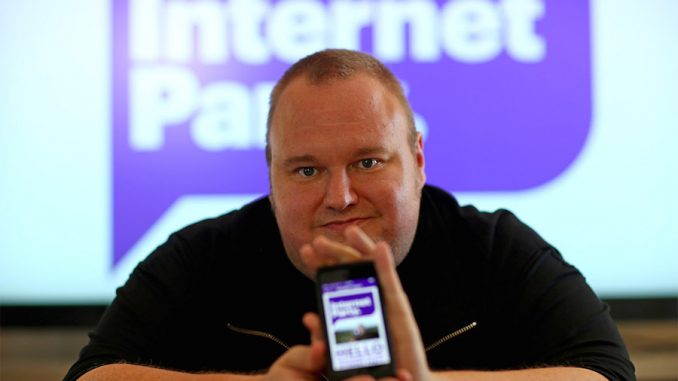
Kim Dotcom has announced plans to build his own private internet, named MegaNet, which will be safe from government surveillance.
The new form of browsing the internet will rely on its users’ unused processing power on their phones and laptops, which will be utilised to provide bandwidth to the service.

BYPASS THE CENSORS
Sign up to get unfiltered news delivered straight to your inbox.
You can unsubscribe any time. By subscribing you agree to our Terms of Use
Latest Video
Stuff.co.nz reports:
“The more people that install the MegaNet app on their devices, the more powerful it will become,” Dotcom said via video link at Sydney’s SydStart conference last week.
If 100 million smartphones joined up, the network would have more online storage capacity, bandwidth and calculating power than the top 10 largest websites in the world combined, he said.
It will rely on existing physical internet infrastructure people use today – so-called “dumb pipes” – but will add a new layer of encryption running through all communications.
Dotcom claimed the encryption technology he’ll use is so powerful no super computer will be able to crack it.
The web mogul explained that “MegaNet” will work on a non-IP-based internet “that uses the beauty of blockchain [Bitcoin’s public ledger] and new protocols to communicate and exchange data”, while still using the internet’s existing physical infrastructure.
“If you don’t have IP addresses you can’t hack the server, you can’t execute denial of service attacks on gaming services or websites,” Dotcom said from New Zealand, where he is currently awaiting the result of an extradition trial.
“Most importantly it will make it difficult for governments to invade our privacy. This entire network I’m working on is fully encrypted. It literally works from the people for the people.”
In order to function, MegaNet is literally going to be using up your device’s battery power, storage capacity and web bandwidth to power its so-called private network.
If you consent, it will draw from your smartphone’s processing power and bandwidth while it’s idle – for instance, when you’re asleep – if it’s plugged in and connected to Wi-Fi.
However, Dotcom said MegaNet’s default settings would use only processing power, and users would opt in to donate bandwidth.
“In the beginning you set your restrictions,” he said.
“The default is no use of bandwidth, and only storage on your phone. But if you want to, it enables us to utilise some of your bandwidth . Users are fully in control. It’s not costing them anything.”
As for the blockchain, MegaNet will borrow from Bitcoin’s lauded method of recording transactions, but instead of users storing transaction records, they will store some of the files that make up this new “alternative private internet”.
Presumably these will be encrypted too, otherwise everyone who connects to MegaNet will have some record of who is using the system and for what purpose, and that would contradict Dotcom’s pitch.
The millionaire admitted that phone technology, including battery life, will need to improve before MegaNet can really take off.
“We’re looking at a 10-year plan,” he said.
“Over the next decade, current smartphones are going to be replaced by phones 10 times stronger and faster, with massively more computing power, that are as powerful as desktop computers are today.
“Battery tech in the making is going to give you 24 to 48 hours battery time with full usage. There are lots of advancements currently taking place. Today’s bottlenecks might be a challenge, but over the years, with new devices and new capacity with mobile bandwidth, there will be no limitations.”
The mogul is confident that a technology solution will keep people secure and that privacy doesn’t require new infrastructure.
“Right now they’re just my words, but I’ll prove it to you with proof when the service goes live. You watch. The security community will appraise it and validate this service.”
Dotcom expects 100 million users to sign up within the first year of launch (expected sometime in 2016).


